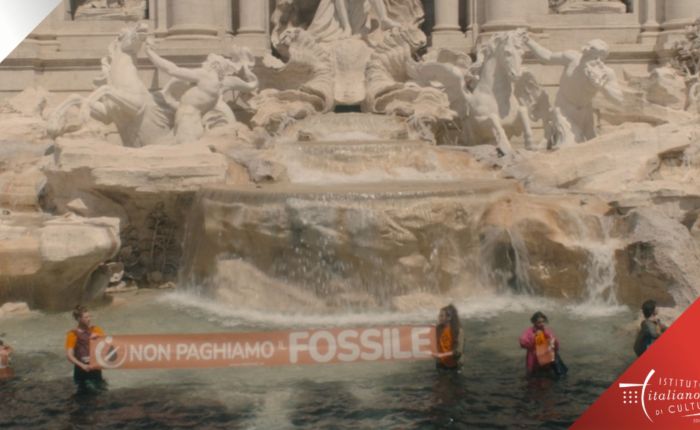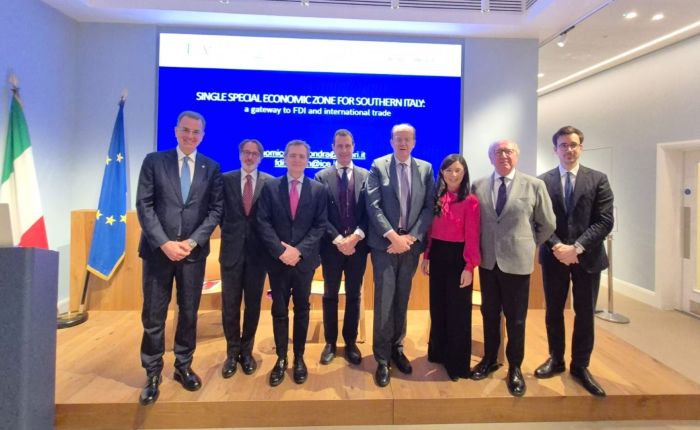"La Grande Ambizione" di Andrea Segre: Enrico Berlinguer, l’uomo e il politico

Con "La Grande Ambizione", Andrea Segre ci regala un ritratto intenso e sfaccettato di Enrico Berlinguer, storico leader del Partito Comunista Italiano negli anni Settanta. Il film non è solo un racconto politico, ma una riflessione profonda su un uomo che ha dedicato la sua vita a un’idea, cercando di conciliare ideali e realtà, etica e strategia, visione e compromesso.
Al centro della narrazione c’è il progetto del Compromesso Storico, la strategia con cui Berlinguer tentò di costruire un’alleanza con la Democrazia Cristiana per garantire stabilità all’Italia in un momento di forti tensioni politiche e sociali. Una scelta coraggiosa, ma anche controversa, che portò divisioni all’interno dello stesso PCI e accese un dibattito acceso nel Paese. Segre racconta questo passaggio cruciale con grande attenzione, mostrando non solo il politico determinato, ma anche l’uomo che si interroga, che riflette, che affronta il peso delle proprie scelte.
Un uomo di principi in un’epoca di conflitti
Uno degli aspetti più riusciti del film è la capacità di intrecciare la dimensione pubblica e quella privata di Berlinguer. Non siamo di fronte a un’agiografia, né a una decostruzione del personaggio: Segre sceglie una via più complessa, restituendo un ritratto di grande umanità.
Elio Germano offre un’interpretazione straordinaria, riuscendo a catturare la riservatezza e la fermezza di Berlinguer. Il leader comunista viene raccontato come un uomo sobrio, lontano dai toni enfatici della politica dell’epoca, ma capace di esercitare un’enorme influenza grazie alla sua coerenza e alla sua integrità morale. Nel corso del film, lo vediamo alle prese con la difficile sfida di mantenere fede ai propri ideali senza chiudersi in un dogmatismo sterile. Il suo volto spesso segnato dalla stanchezza, il suo tono misurato, i suoi silenzi dicono molto più di tanti discorsi.
Il racconto non si limita alla dimensione politica. Viene esplorato anche il lato più personale di Berlinguer: il suo rapporto con la famiglia, i momenti di riflessione privata, il peso della responsabilità che grava sulle sue spalle. La sceneggiatura evita di scivolare nel sentimentalismo, ma offre squarci di profonda umanità, mostrandoci un uomo che, pur dedicandosi completamente alla politica, non è immune alla solitudine e alle incertezze.

L’Italia degli anni Settanta: tra speranze e paure
Il film restituisce con grande efficacia il clima dell’Italia degli anni Settanta, un periodo segnato da forti tensioni sociali, scioperi, crisi economiche e dalla minaccia del terrorismo. Le Brigate Rosse seminavano paura, mentre lo spettro di un colpo di stato, sulla falsariga di quello avvenuto in Cile, era una preoccupazione concreta. In questo contesto di instabilità, Berlinguer cercò di proporre una via alternativa, immaginando un comunismo democratico e autonomo dall’Unione Sovietica.
La regia di Segre si distingue per l’attenzione ai dettagli storici. Attraverso l’uso di filmati d’epoca e una ricostruzione accurata degli ambienti, "Berlinguer: La Grande Ambizione" ci immerge in quel periodo complesso e turbolento. Le strade di Roma, le sezioni del PCI, i comizi gremiti di folla: tutto è rappresentato con un realismo che rende la narrazione ancora più coinvolgente.
Un aspetto particolarmente interessante è il modo in cui il film racconta le tensioni interne al Partito Comunista. Berlinguer non dovette solo affrontare le resistenze della DC e delle altre forze politiche, ma anche i dubbi e le critiche che nascevano all’interno del PCI stesso. Molti militanti temevano che il Compromesso Storico fosse un tradimento degli ideali comunisti, un cedimento alle logiche di potere. Il film esplora queste dinamiche con intelligenza, mostrando un Berlinguer determinato ma consapevole delle difficoltà di tenere unito il partito.
Un’eredità ancora attuale
Ciò che rende "Berlinguer: La Grande Ambizione" un film di grande rilevanza è la sua capacità di parlare non solo del passato, ma anche del presente. La politica di Berlinguer, basata sulla trasparenza, sull’etica e sulla difesa dei valori collettivi, risuona ancora oggi, in un’epoca in cui spesso la politica appare svuotata di ideali e dominata dal pragmatismo opportunistico.
Andrea Segre, da sempre attento ai temi sociali e politici nei suoi film, dirige con sensibilità e rigore, evitando facili semplificazioni. Non c’è retorica, non c’è mitizzazione: c’è il racconto di un uomo e di un’epoca, con tutte le sue contraddizioni. Il film non dà risposte definitive, ma invita lo spettatore a riflettere su cosa significhi davvero fare politica con onestà e coerenza.
L’ultima parte del film, dedicata agli ultimi anni di Berlinguer, è particolarmente toccante. La sua morte improvvisa, avvenuta durante un comizio a Padova nel 1984, è rappresentata con grande sobrietà, senza enfasi drammatica ma con una potenza emotiva che colpisce nel profondo. È un finale che chiude il film nel segno della coerenza: Berlinguer muore facendo quello che ha sempre fatto, parlando alla gente, cercando di costruire un futuro migliore.

Conclusione: un ritratto intenso e necessario
"Berlinguer: La Grande Ambizione" è un film che riesce a unire la dimensione storica a quella umana, restituendo il ritratto di un leader politico fuori dal comune. Grazie alla straordinaria interpretazione di Elio Germano e alla regia attenta di Segre, il film ci porta dentro un’epoca di grandi speranze e grandi difficoltà, facendo emergere la figura di Berlinguer con tutte le sue sfumature.
Per chi conosce già la storia politica italiana, il film è un prezioso viaggio nella memoria, un’occasione per riflettere su un periodo in cui la politica era ancora vissuta come un impegno collettivo. Per chi invece si avvicina per la prima volta a questa figura, "Berlinguer: La Grande Ambizione" è un’introduzione perfetta, capace di trasmettere l’eredità di Berlinguer in modo coinvolgente e attuale.
In un’epoca in cui l’integrità politica sembra sempre più rara, questo film ci ricorda che esistono ancora modelli di leadership basati sulla coerenza, sul sacrificio e sulla volontà di costruire un mondo più giusto. Un messaggio che, oggi più che mai, risuona con forza.
ENGLISH VERSION
"The Great Ambition" by Andrea Segre: Enrico Berlinguer, The Man and The Politician
An evocative and meticulously crafted biographical drama that brings to life Enrico Berlinguer
Andrea Segre’s "The Great Ambition" is an evocative and meticulously crafted biographical drama that brings to life the complex figure of Enrico Berlinguer, the leader of the Italian Communist Party (PCI) during the 1970s. More than just a political chronicle, the film is a deeply human exploration of a man torn between his ideological convictions, the turbulent realities of Italian politics, and his personal life.
At the heart of the film is Berlinguer’s vision of the Compromesso Storico (Historic Compromise), a political strategy that sought an unprecedented alliance between the PCI and the Christian Democrats (DC) in the name of national stability. This ambitious project, while controversial, was rooted in Berlinguer’s belief that communism and democracy could coexist in Italy without succumbing to the totalitarian models seen in the Soviet bloc. Segre masterfully captures this ideological struggle, not only in the political arena but also in Berlinguer’s internal conflicts—his fears, hesitations, and the burden of leading a party that looked to him for direction in a time of great social and economic turmoil.
A Man of Integrity in a World of Political Tensions
One of the film’s greatest strengths is how it balances Berlinguer’s public and private personas. In most political biographies, the protagonist is often either glorified as a heroic figure or dissected for their flaws. Segre, however, chooses a different path. He presents Berlinguer as a man of quiet but firm convictions, a leader who stood out not for grandstanding but for his sincerity and moral rigor.
Elio Germano delivers a remarkable performance as Berlinguer, capturing the reserved yet intensely focused nature of the politician. Germano’s portrayal highlights Berlinguer’s deep sense of duty, his thoughtful demeanor, and his emotional restraint. The audience sees a leader who is not just battling external opponents but also grappling with internal dilemmas. How far could he push for compromise without betraying his communist ideals? Could he bridge the gap between ideological purity and pragmatic governance? These questions loom over the film, giving it a sense of dramatic urgency.
Beyond the political stage, "The Great Ambition" provides glimpses into Berlinguer’s personal life, revealing the emotional toll of his political mission. His relationship with his family, particularly with his wife and children, is depicted with subtlety and warmth. Though devoted to his cause, he is shown as a father who struggles with the time he spends away from his family, a husband whose moments of tenderness are often overshadowed by the weight of his responsibilities. These personal moments add depth to his character, making him more than just a historical figure but a man caught in the push and pull of duty and personal longing.
The Political Landscape of the 1970s: A Nation at a Crossroads
Segre places Berlinguer’s story in the broader context of 1970s Italy, a period of intense social upheaval and political violence. The country was marked by economic crises, widespread strikes, and the threat of domestic terrorism, particularly from the Red Brigades and other extremist groups. The fear of a right-wing coup, as had happened in Chile, loomed over the left, while the Communist Party sought to maintain its growing influence in a democratic framework.
The film’s cinematography and production design immerse the audience in this tumultuous era. Archival footage is seamlessly integrated into the narrative, blending fiction and reality in a way that enhances the film’s historical authenticity. The streets of Rome, the meeting rooms of the PCI, the tense political rallies—each setting is meticulously reconstructed to transport the viewer back in time. The choice of muted color palettes and documentary-style camerawork reinforces the neorealist approach, making the events feel immediate and urgent.
One of the most compelling aspects of "The Great Ambition" is how it portrays the dynamics within the Communist Party itself. Berlinguer was not only facing opposition from outside forces but also from within his own ranks. Many in the PCI were skeptical of the Compromesso Storico, fearing that any alliance with the Christian Democrats would dilute the party’s revolutionary goals. The film skillfully navigates these tensions, showing Berlinguer as a leader who had to negotiate not only with political opponents but also with comrades who questioned his strategy.
A Legacy That Resonates Today
What makes "The Great Ambition" particularly relevant today is its exploration of political ethics and the role of ideology in governance. Berlinguer’s vision of a more just and democratic socialism was, in many ways, ahead of its time. He rejected both the authoritarianism of Soviet-style communism and the unchecked capitalism of the West, advocating instead for a politics based on moral integrity and public service. His concerns about corruption, the alienation of the working class, and the loss of ideological principles in politics are issues that still resonate in contemporary Italy and beyond.
Andrea Segre, known for his documentaries and socially conscious films, directs "The Great Ambition" with a sense of purpose. He does not seek to mythologize Berlinguer but to present him as a leader whose ideals and struggles remain strikingly relevant. The film does not provide easy answers, nor does it attempt to portray Berlinguer as an infallible hero. Instead, it invites the audience to reflect on the nature of political leadership—what it means to fight for change while navigating the constraints of reality.
The film’s final moments are among its most poignant, reflecting on Berlinguer’s sudden death in 1984 during a political rally in Padua. It is a moment that encapsulates the essence of his character: a man who never stopped working for his vision, even in his final moments. The quiet yet profound impact he left on Italian politics is felt not just through the archival footage that closes the film but through the emotional weight carried by Germano’s performance.
Conclusion: A Thoughtful and Timely Portrait of a Political Icon
"The Great Ambition" is more than just a biopic; it is a meditation on power, integrity, and the sacrifices of leadership. Andrea Segre has crafted a film that is both intimate and expansive, weaving together the personal and the political with remarkable finesse. Through a stellar performance by Elio Germano and a carefully researched historical backdrop, the film brings Enrico Berlinguer to life in a way that feels deeply authentic.
For those familiar with Italian history, the film is a powerful reminder of a time when political discourse was driven by ideals and vision rather than mere pragmatism. For new audiences, it serves as an introduction to a leader whose name may not be as internationally recognized as others but whose influence continues to shape political thought.
In an era where political integrity often feels like a relic of the past, "The Great Ambition" stands as a compelling and necessary film, urging us to remember that leadership is not just about power but about conviction, sacrifice, and, above all, an unwavering commitment to the greater good.





